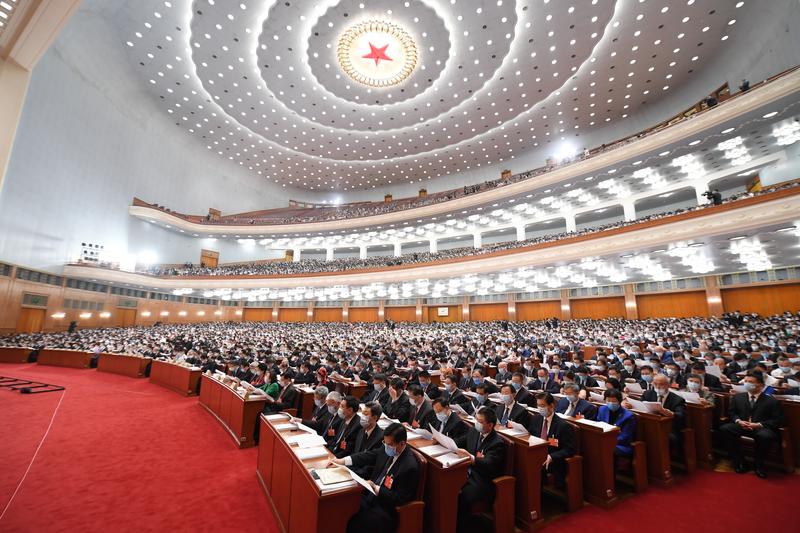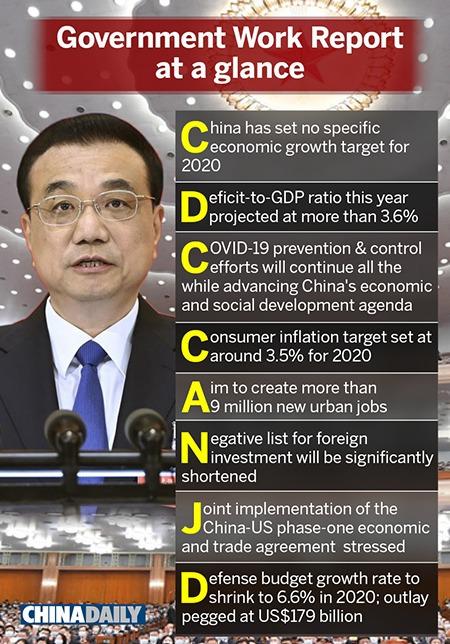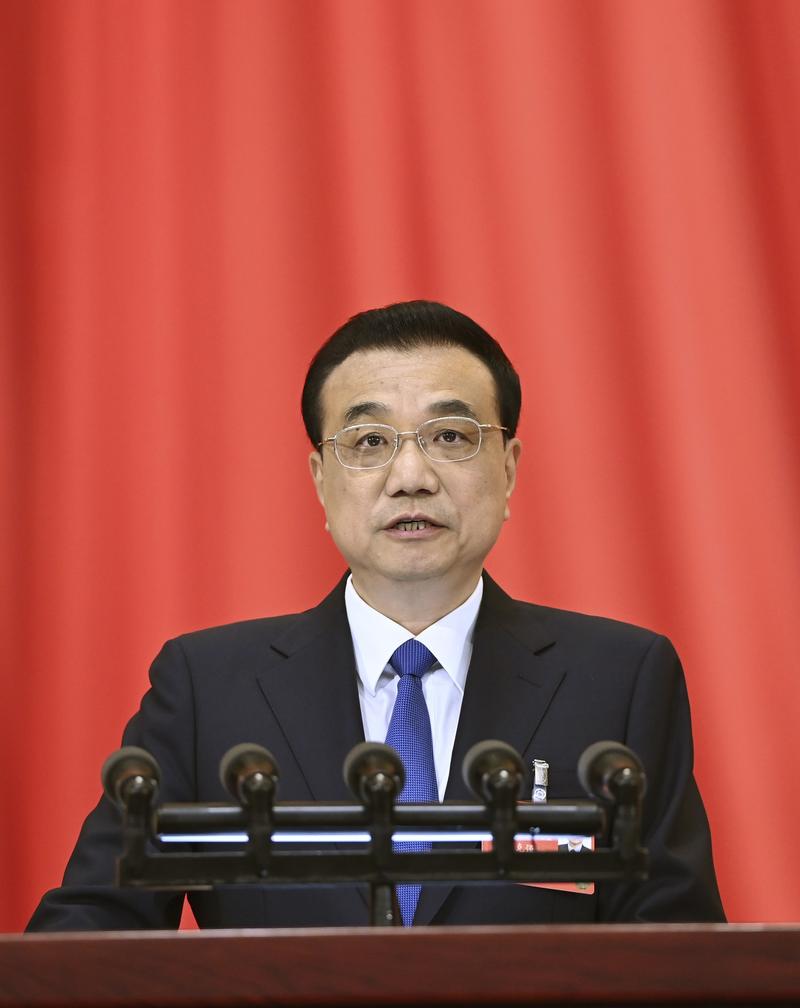 The third session of the 13th National People's Congress (NPC) opens at the Great Hall of the People in Beijing, capital of China, May 22, 2020. (PHOTO / XINHUA)
The third session of the 13th National People's Congress (NPC) opens at the Great Hall of the People in Beijing, capital of China, May 22, 2020. (PHOTO / XINHUA)
BEIJING - China will work to ensure achieving the development goals of winning the battle against poverty and completing the building of a moderately prosperous society in all respects this year, though setting no specific economic growth target for 2020, according to a government work report submitted to the 13th National People's Congress (NPC) for deliberation on Friday.
The work report was submitted as China's national legislature started its annual session Friday morning in Beijing.
China's deficit-to-GDP ratio this year is projected at more than 3.6%
Xi Jinping and other Chinese leaders attended the opening meeting of the third session of the 13th NPC, held at the Great Hall of the People.
Lawmakers paid a silent tribute to martyrs who died fighting COVID-19 and compatriots who lost their lives in the epidemic.
After the period of silence, Premier Li Keqiang delivered the government work report on behalf of the State Council to the legislature for deliberation.
Noting that China's economy posted negative growth in the first quarter of this year, the government said in the report that it was "a price worth paying" to contain COVID-19 as life is invaluable and the country will redouble its efforts to minimize the losses resulting from COVID-19 and fulfill the targets and tasks for economic and social development this year.
ALSO READ: Nation will keep up effort on all fronts
China's deficit-to-GDP ratio this year is projected at more than 3.6 percent. The ratio was 0.8 percentage points higher than that of last year.
The deficit increase is projected at 1 trillion yuan (about US$141.6 billion) over last year, according to the report.

Making it clear that China will spare no efforts in its regular prevention and control of COVID-19 the government said it will not lose any time in advancing its economic and social development agenda.
China plans to issue government bonds worth 1 trillion yuan (about US$141 billion) for COVID-19 control.
China will pursue a prudent monetary policy in a more flexible and appropriate way and will strive to eliminate poverty among all rural residents living below the current poverty line and in all poor counties this year.
China has set its consumer inflation target at around 3.5 percent for the year of 2020, aims to create more than 9 million new urban jobs and will increase financial support to keep business operations stable.
Large commercial banks should increase inclusive finance lending to micro and small businesses by more than 40 percent, according to the report.
China plans to issue government bonds worth 1 trillion yuan (about US$141 billion) for COVID-19 control
China aims to expand effective investment with priority given to new infrastructure, new urbanization initiatives and major projects and will continue to foster an enabling environment for the development of the private sector and ensure private businesses have equal access to production factors and policy support.
READ MORE: China to advance opening up, ease market access
The country will review relevant regulations to abolish those that unfairly differentiate enterprises according to ownership forms.
Deadlines will be set for government bodies to make overdue payments owed to private and small and medium-sized businesses, according to the report.
Also in the report, the government pledged to work to improve the consumption willingness and capabilities of domestic residents and support the recovery and development of consumer service sectors.
China will significantly shorten its negative list for foreign investment, according to the work report submitted by Premier Li
Trade
According to the work report submitted by Premier Li, China will significantly shorten its negative list for foreign investment. While pledging to further stabilize foreign trade and actively leverage the role of foreign capital, China stressed the joint implementation of the China-US phase-one economic and trade agreement.
This apart, new pilot free trade zones (FTZs) and integrated bonded areas will be established in the country's central and western regions.
China will resolutely safeguard the multilateral trading regime and actively participate in reform of the World Trade Organization.
Also, China will focus on high-quality joint building of the Belt and Road, and carry out mutually beneficial cooperation.
 Chinese Premier Li Keqiang delivers a government work report at the third session of the 13th National People's Congress (NPC) at the Great Hall of the People in Beijing, capital of China, May 22, 2020. (PHOTO / XINHUA)
Chinese Premier Li Keqiang delivers a government work report at the third session of the 13th National People's Congress (NPC) at the Great Hall of the People in Beijing, capital of China, May 22, 2020. (PHOTO / XINHUA)
Defense
China will continue to lower its defense budget growth rate to 6.6 percent in 2020, according to the draft budget report.
The 2020 defense budget continues to see single-digit growth for a fifth consecutive year. It is the lowest growth rate in recent years.
China will continue to lower its defense budget growth rate to 6.6% in 2020, according to the report
This year's defense budget will be around 1.27 trillion yuan (about US$179 billion).
READ MORE: Worries over defense budget unwarranted
China's total defense spending in 2019 only amounted to a quarter that of the US, the world's largest defense spender, while the per capita expenditure was just about one-seventeenth.
Noting that China has no "hidden military spending," Zhang Yesui, spokesperson for the third session of the 13th NPC, said at a press conference held ahead of the NPC's annual session that the country is transparent about its defense spending.
China's defense spending has been staying at around 1.3 percent of its gross domestic product for many years, well below the world's average of 2.6 percent, Zhang said.
The government will implement city-specific policies to promote steady and healthy development of the real estate market, according to the report
Health and welfare
China will strengthen the development of the public health system with special emphasis on improving the direct-reporting and early warning systems for infectious diseases, increasing spending on vaccines, drugs and fast testing technologies, increasing mobile labs and strengthening the supply of emergency materials, among other things, as per the work report.
Also, China will increase the basic pension for retirees and the minimum basic old-age pension for rural and non-working urban residents.
Stressing that it is imperative and well within China's ability to ensure the food supply for 1.4 billion Chinese people through the country's own efforts, the Chinese government pledged to bolster agricultural production by increasing its area of high-standard cropland by 80 million mu (5.33 million hectares).
This apart, China will stick to its principle of "housing is for living in, not for speculation". As such, the government will implement city-specific policies to promote steady and healthy development of the real estate market, according to the report.


